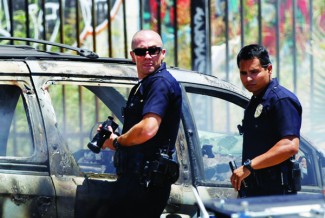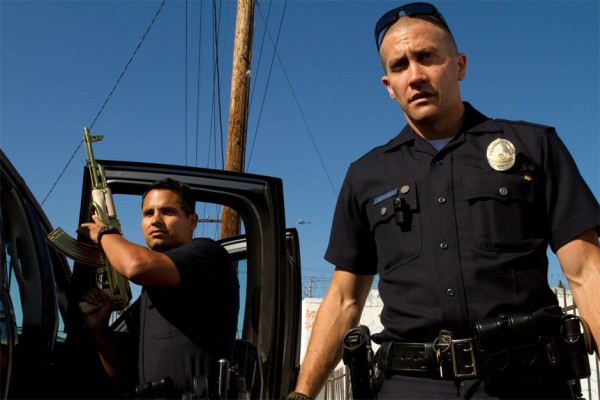‘End of Watch’ is visceral, violent, vice-ful

End of Watch creeped up on me and totally floored my expectations. Here was another police procedural / buddy cop drama, so I thought. Would it be in the same vein as the paint-by-numbers TV shows, like Criminal Minds, NYPD Blue, Law & Order? Hadn’t this genre been exhausted already?
It turns out that the film, written and directed by David Ayer, is more similar to Dark Blue, that noirish gem from a few years ago starring Kurt Russell. Here we have two officers with the Los Angeles Police Department both flawed and heroic. We like them, mostly because we spend so much time with them, but they bend the rules to the point of revulsion. There’s a suspect with spewing profanity? Let’s beat him up. There’s a couple of kids stuck in a burning house? Let’s save them. There’s a bad guy with a gun? Let’s end this the old-fashioned way. Do we route for them or strip them of their badges?
Brian Taylor (Jake Gyllenhaal) and Mike Zavala (Michael Peña) are cowboy cops with a moral compass. They’re conscious of the players on their beat, which includes the tortured terrain of Los Angeles, the grittiest neighborhoods with the shadiest characters. They’re foot soldiers in this street war, but Brian has aspirations of using his detective skills to dig a little deeper. The problem occurs when the two dig too deep, unearthing a burgeoning cartel operation bankrolled and supported by Mexican drug lords. They need to watch their back, even more than usual, because everyone now looks like a suspect.
Ayer’s fim is perhaps the most energetic, fast-paced release of 2012. This is largely due to the movie’s insistence on presenting much of the material as “found footage,” that device often reserved for the horror realm. To be honest, the camera technique only works half the time in End of Watch. The other half of the time, it becomes tiresomely shaky and annoying. The story and characters are good enough to be presented with all the beeps and whistles of a typical Hollywood production, and the subplot that Brian is an aspiring filmmaker feels like a cop out.

Gyllenhaal and Peña have perfect chemistry with each other, and it’s easy to believe that they’re like blood brothers both in and out of the police car. They share stories about their personal lives and work through life’s chapter headings by seeking advice from each other. Their banter seems real and organic, as if someone hit record on a conversation between friends. I’m wondering how much is Ayer’s script and how much is improvisational. It’s that good.
The portraits of these two men can be deceptive. We’re definitely led to feel sorry for their predicament, and there’s no doubt that they perform acts of sheer heroism. However, what about their “cowboy” mentality and breaking of the rules? Are they too trigger-happy? Do they strike too hard and too often? There definitely seems to be a lot of bloodshed at the end of each day.
Ayer purposefully keeps these central characters in that blurry line between likable and questionable. He neither passes judgment nor lets them off the hook. Instead, we’re given almost two hours of pure, visceral footage, almost like we’re watching a documentary rather than a dramatic film. It’s a credit to all involved that we’re glued to the screen for the entire duration, constantly wanting to know more about these dynamic characters.
By John Soltes / Publisher / John@HollywoodSoapbox.com
-
End of Watch
-
2012
-
Written and directed by David Ayer
-
Starring Jake Gyllenhaal and Michael Peña
-
Running time: 110 minutes
-
Rated R for strong violence, some disturbing images, pervasive language including sexual references and some drug use
-
Rating:





